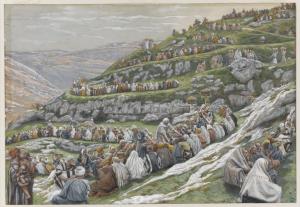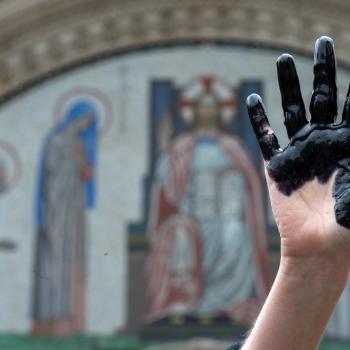
The feeding of the five thousand (which really, was more than five thousand, because the five thousand mentioned is only the number of men who were fed, while the women and children, like so often is the case, were left uncounted) indicates the way God works with us. He expects us to do our part; if we do, then he will complement our action with his bountiful grace:
When it was evening, the disciples came to him and said, “This is a lonely place, and the day is now over; send the crowds away to go into the villages and buy food for themselves. 16 Jesus said, “They need not go away; you give them something to eat” (Matt. 14:15-16 RSV).
Here, we see two different attitudes. Jesus’ disciples thought the crowd should be told to go away and buy food for themselves. Jesus, on the other hand, wanted them to stay, to be with him, and told his disciples to feed the crowd. He didn’t want his disciples to think they should simply dismiss those in need.
We often see the attitude displayed by the disciples by many so-called Christians today. They tell people to depart, to go and earn their own keep; if they want food, they must work for it and buy it for themselves. But what does Jesus say of this? Those who have should give to those who do not. People need not be turned away. The bounty is already there.
The disciples did not want to do so, and they showed their lack of faith by saying they did not think they had enough food for feeding the crowd:
They said to him, “We have only five loaves here and two fish.” And he said, “Bring them here to me” (Matt. 14:17-18 RSV).
Perhaps, it is true, the disciples did not have much food themselves. Nonetheless, how did they get what they had? Jesus and his disciples held their goods in common and shared them in common, with Judas acting as the treasurer (cf. Jn. 13:29). Where did their wealth and material goods, such as food, come from? We are not told. It is likely some had money of their own and donated it to the common cause of Christ, but it is also likely that they received alms from those who came to listen to Jesus (as it was a common practice to help iterant preachers in such a manner).
Jesus knew that what was held in common by the disciples was not meant for them alone, but for everyone. His disciples should not consider themselves so privileged, so elite, that they could receive from others while thinking everyone else should only have what they can earn by themselves. The faithful should be working together in love so that their resources could be and would be used by all. What was collected by the disciples from others was not for them alone, but for all. His disciples should be willing to share with others just as others shared with them. Even if it was not much, God’s grace could take what was offered and make more of it so that something extraordinary could happen:
Then he ordered the crowds to sit down on the grass; and taking the five loaves and the two fish he looked up to heaven, and blessed, and broke and gave the loaves to the disciples, and the disciples gave them to the crowds. And they all ate and were satisfied. And they took up twelve baskets full of the broken pieces left over. And those who ate were about five thousand men, besides women and children (Matt. 14:19-21 RSV).
Whether one reads this story as Jesus’ grace inspiring the crowd to share with each other, following the example of the disciples after they started to share their own food, or if Jesus literally multiplied what was given through divine powers, the result is the same: God’s grace, when mixed with human activity, is able to produce great fruit. Both the grace, and human activity are necessary: grace perfects nature, but without a nature to perfect, the potential of grace is unrealized. And so, when dealing with people in need, those who possess in excess should give to those in need, allowing God’s grace to perfect the situation instead sending away those in need, expecting them to somehow make do for themselves. This is why riches are not, in themselves, the problem, but the abuse of those riches which leads to sin:
For, riches in themselves are not harmful, but the minds of those who put them to evil use are sinful. Nor is wealth a cause of punishment to man, but the rich make unto themselves punishments because of their wealth. They are unwilling to use riches properly and they convert these very riches into punishments for themselves.[1]
Those who ignore the needs of the other, departing from them when they can be of help, are like those in the parable of the Good Samaritan who left the wounded man to fend for himself. Judas, likewise, was shown to be unfaithful in his position as treasurer, as he was more concerned with the money than the ways it could and should be put to good use. Without faith, without right action, the potential of grace will not be actualized, and so both the one who suffers and the one who does not act will both experience the pain and suffering which follows when people do not act according to the dictates of love.
We are to come together, to work together and promote the common good – both within the church, but also within society as a whole. The disciples were meant to share what they had with the crowd, feeding them, and the church is meant to share what it has to help the world at large, feeding them with spiritual and physical nourishment. We are to be the salt of the earth, the leaven which makes things better. But how can we be so if we ignore our responsibility and act selfishly like Judas, thinking it is all about ourselves and our own particular desires? Alas, many so-called Christians do not want to listen to this, they do not want to hear about the common good – either in the church or in society – and instead, they want to divide themselves up from everyone else. They cause dissensions, breaking up the unity which is meant to be had in the church (and in society as a whole). What does Paul say to this?
I appeal to you, brethren, by the name of our Lord Jesus Christ, that all of you agree and that there be no dissensions among you, but that you be united in the same mind and the same judgment. For it has been reported to me by Chloe’s people that there is quarreling among you, my brethren. What I mean is that each one of you says, “I belong to Paul,” or “I belong to Apollos,” or “I belong to Cephas,” or “I belong to Christ” (1 Cor. 1:10 -12 RSV).
Paul didn’t even want people following him as if he alone were to be followed and church unity was destroyed. He knew that Christ came to unite us together, so that together we would activate the grace which leads to our participation in the divine life. We are to be united, to be as one, even as God is one; those who promote individualism over unity of the faith, those who promote individualism over the common good of the church, those who promote individualism over the common good of humanity, cut up what is to be one in Christ, and so hinder the activation of grace in the world. Those who seek their own gain over the common good will lose it, while those who give themselves over to the common good will also receive a bounty of good for themselves. Thus, at the feeding of the five thousand, the disciples ate and enjoyed the bounty established by God’s grace, but if they had tried to keep what little food they had for themselves, it would not have been enough to sustain them for another day. When we try to hold onto the bounty of grace which God has given to us and think it belongs to ourselves alone, we will likewise find it is a limited good which will perish once that limit has been reached, but if we willingly share it with others, then it will become exponentially greater, and we too, shall experience the miracle represented in the feeding of the five thousand in our own lives. We must learn the lesson of the feeding of the five thousand. It is not just about the way God shares his grace, it is also about the way we activate that grace through our own self-giving.
[1] Salvian the Presbyter, “The Four Books of Timothy to the Church” in The Writings of Salvian the Presbyter. Trans. Jeremiah F. O’Sullivan (Washington, DC: CUA Press, 1962), 282.
Stay in touch! Like A Little Bit of Nothing on Facebook.
If you liked what you read, please consider sharing it with your friends and family!












